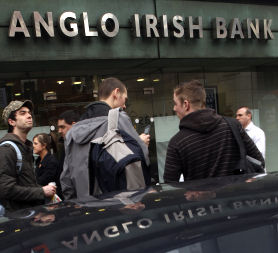Ireland’s economic and reputational crisis
As Ireland faces a 34bn euro bill to prop up the ailing Anglo Irish bank, economic analyst Peter Stafford looks at how the country will cope with its uncertain economic future.

In March 2009, a Dublin-based government think tank reported that the crisis which faced Ireland was not simply one of economics – the country, its government, banking and financial sectors also faced a reputational crisis. The report from the influential National Economic and Social Council ominously warned that – unlike a banking crisis – a reputational crisis was less quantifiable but potentially more disastrous to Ireland over the medium-term. September 2010 has become the period in which Ireland’s various crises have converged.
The rising cost of borrowing for Ireland is the clearest demonstration of how declining international reputation has a financial consequence. Last week, the Government sold 1bn euros of eight-year bonds at an average yield of 6.023 per cent, compared to 5.088 per cent at a previous sale in June. The 384 spread points between German and Ireland bonds are a direct consequence of a lack of confidence in economic future.
That economic future remains equally uncertain this morning with the Government announcement that the cost of bailing out Anglo Irish Bank will be 29.3bn euros, and the total cost of bailing out all of the damaged Irish banks could be 34bn euros. To put this figure into some sort of context, the total tax income to the Irish exchequer in 2009 was also 34bn euros.
As the stock market reacts to this news, and as Irish bonds head towards the landmark 7 per cent mark, many commentators in Ireland are now wondering if it can be long before the cost of borrowing simply becomes too high for Ireland, and the IMF are called in.
Many commentators in Ireland are now wondering if it can be long before the cost of borrowing simply becomes too high for Ireland, and the IMF are called in.
The massive cost of funding Ireland’s banks means that Ireland’s GDP deficit will be pushed out to 32 per cent this year. But it remains government policy to reduce that deficit back to 3 per cent by 2014, a policy aim which has been met with incredulity by journalists, economists and the stock market this morning who look to the high cost of borrowing and Ireland’s stubbornly high unemployment, both of which will undermine any deficit reduction programme.
Domestically, the current government faces its own reputational and political crises as its parliamentary majority weakens and the independent TDs on whom it relies are no longer reliable supporters of the government. A series of opinion polls over the last couple of weeks has put taoiseach’s Brian Cowen’s personal approval rating at only 19 per cent, which will make those independent TDs even less supportive of a government which will be forced to raise taxes and introduce enormous spending cuts in December’s budget to reduce the deficit and keep the EU and IMF at bay.
Internationally, Brian Cowen’s reputation – and by default that of the country – took something of a battering when he appeared, slurred and confused, on a RTE radio early morning news programme the morning after his party’s country-house hotel “think in”. When an opposition TD suggested he was drunk or hung-over, the interview was covered in more than 400 articles in 26 countries, including a toe-curling segment on US ‘The Tonight Show’ in which Jay Leno called him a “drunken moron” to wild applause from the audience.
At home, the social impact of the Irish economic crisis is only now becoming clear as funds are diverted from front line public services towards the seemingly black-hole of the non-functioning banks. At a mass protest outside Leinster House, the Irish parliament yesterday, protestors carried banners comparing the fates of jailed financier Bernard Madoff and the Irish banking elite who remain in their posts at the tax payers’ expense. The slogan “two Brians, no brains” was much in evidence at the protests yesterday, suggesting a lack of faith in the ability of Brian Cowen and Brian Lenihan to resolve not just the banking crisis, but their ability to restore confidence in Ireland’s tattered international reputation.